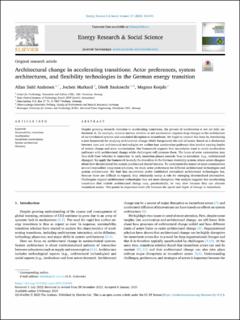Bitte benutzen Sie diese Kennung, um auf die Ressource zu verweisen:
https://doi.org/10.21256/zhaw-28162| Publikationstyp: | Beitrag in wissenschaftlicher Zeitschrift |
| Art der Begutachtung: | Peer review (Publikation) |
| Titel: | Architectural change in accelerating transitions : actor preferences, system architectures, and flexibility technologies in the German energy transition |
| Autor/-in: | Andersen, Allan Dahl Markard, Jochen Bauknecht, Dierk Korpås, Magnus |
| et. al: | No |
| DOI: | 10.1016/j.erss.2023.102945 10.21256/zhaw-28162 |
| Erschienen in: | Energy Research & Social Science |
| Band(Heft): | 97 |
| Heft: | 102945 |
| Erscheinungsdatum: | 2023 |
| Verlag / Hrsg. Institution: | Elsevier |
| ISSN: | 2214-6296 2214-6326 |
| Sprache: | Englisch |
| Schlagwörter: | Sustainability transition; Acceleration; Incumbent reorientation; System architecture |
| Fachgebiet (DDC): | 333.79: Energie |
| Zusammenfassung: | Despite growing research attention to accelerating transitions, the process of acceleration is not yet fully understood. It, for example, remains unclear whether or not acceleration requires deep changes in the architecture of sociotechnical systems and associated disruption to incumbents. We begin to unravel this issue by introducing a new framework for studying architectural change which foregrounds the role of actors. Based on a distinction between core and architectural technologies we outline four acceleration pathways that involve varying depths of system change and actor reorientation. Our framework suggests that incumbents want to avoid acceleration pathways with architectural change while challengers will promote them. The locus of actor contestation may thus shift from ‘whether to transition’ in early transition phases towards ‘how to transition’ (e.g., architectural changes). We apply the framework to study the transition in the German electricity system, where actors disagree about how decentralized the system architecture should become. To understand the nature of actor contestations around renewables integration solutions, we study actor preferences for different architectural technologies and system architectures. We find that incumbents prefer established centralized architectural technologies but, because these are difficult to expand, they reluctantly accept a role for emerging decentralized alternatives. Challengers support architectural technologies that are more disruptive. Our analysis suggests that accelerating transitions that include architectural change may, paradoxically, be very slow because they can alienate incumbent actors. This points to important trade-offs between the speed and depth of change in transitions. |
| URI: | https://digitalcollection.zhaw.ch/handle/11475/28162 |
| Volltext Version: | Publizierte Version |
| Lizenz (gemäss Verlagsvertrag): | CC BY 4.0: Namensnennung 4.0 International |
| Departement: | School of Engineering |
| Organisationseinheit: | Institut für Nachhaltige Entwicklung (INE) |
| Publiziert im Rahmen des ZHAW-Projekts: | Pathways – Conflicting Transition Pathways for Deep Decarbonization SWEET PATHFNDR – Wege in eine effiziente Energiezukunft durch Flexibilität und Sektorenkopplung |
| Enthalten in den Sammlungen: | Publikationen School of Engineering |
Dateien zu dieser Ressource:
| Datei | Beschreibung | Größe | Format | |
|---|---|---|---|---|
| 2023_Andersen-etal_Artitectural-change-in-accelerating-transitions.pdf | 3.96 MB | Adobe PDF |  Öffnen/Anzeigen |
Zur Langanzeige
Andersen, A. D., Markard, J., Bauknecht, D., & Korpås, M. (2023). Architectural change in accelerating transitions : actor preferences, system architectures, and flexibility technologies in the German energy transition. Energy Research & Social Science, 97(102945). https://doi.org/10.1016/j.erss.2023.102945
Andersen, A.D. et al. (2023) ‘Architectural change in accelerating transitions : actor preferences, system architectures, and flexibility technologies in the German energy transition’, Energy Research & Social Science, 97(102945). Available at: https://doi.org/10.1016/j.erss.2023.102945.
A. D. Andersen, J. Markard, D. Bauknecht, and M. Korpås, “Architectural change in accelerating transitions : actor preferences, system architectures, and flexibility technologies in the German energy transition,” Energy Research & Social Science, vol. 97, no. 102945, 2023, doi: 10.1016/j.erss.2023.102945.
ANDERSEN, Allan Dahl, Jochen MARKARD, Dierk BAUKNECHT und Magnus KORPÅS, 2023. Architectural change in accelerating transitions : actor preferences, system architectures, and flexibility technologies in the German energy transition. Energy Research & Social Science. 2023. Bd. 97, Nr. 102945. DOI 10.1016/j.erss.2023.102945
Andersen, Allan Dahl, Jochen Markard, Dierk Bauknecht, and Magnus Korpås. 2023. “Architectural Change in Accelerating Transitions : Actor Preferences, System Architectures, and Flexibility Technologies in the German Energy Transition.” Energy Research & Social Science 97 (102945). https://doi.org/10.1016/j.erss.2023.102945.
Andersen, Allan Dahl, et al. “Architectural Change in Accelerating Transitions : Actor Preferences, System Architectures, and Flexibility Technologies in the German Energy Transition.” Energy Research & Social Science, vol. 97, no. 102945, 2023, https://doi.org/10.1016/j.erss.2023.102945.
Alle Ressourcen in diesem Repository sind urheberrechtlich geschützt, soweit nicht anderweitig angezeigt.